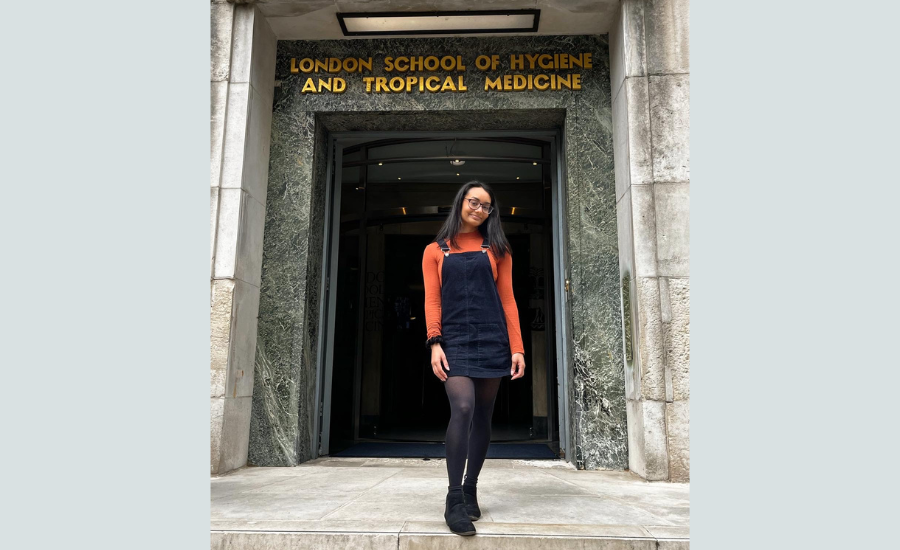Extracurricular opportunities and transferrable skills gained from my time at LSHTM
4 June 2024 London School of Hygiene & Tropical Medicine London School of Hygiene & Tropical Medicine https://lshtm.ac.uk/themes/custom/lshtm/images/lshtm-logo-black.png
MSc Public Health student Shereen outside LSHTM Keppel Street Building.
The School offers SO many opportunities and extracurricular sessions outside of your timetabled MSc modules. During my time here I’ve gained a lot by attending some of these.
Careers service
LSHTM has a truly excellent Careers Service. They offer workshops, which include sessions on:
- The variety of careers in public health and the skills required for each
- Entry routes into different public health sectors and jobs
- CV writing
- Cover letter writing
- Using LinkedIn for networking
- Preparing for interviews
These sessions are both online, in-person and recorded, and you get access to them for a short time after you leave LSHTM too. I found they were so helpful and gave me a good starting point for my post-MSc job search.
Throughout the year, they also host in-person networking events and careers panels, where current public health professionals and LSHTM alumni talk about their career trajectories and offer advice. It was refreshing to hear first-hand perspectives of the public health job market, and how no two experiences are alike!
They also offer two 1-1 meetings throughout the year, which you can use for any purpose you like. They helped me prepare for my PhD application and did a mock interview with me. I have now secured my PhD studentship, and I have them to thank in part!
The careers service is frequently advertised by a School-wide email newsletter and all their services are posted up on Moodle, our virtual learning environment.
English for Academic Purposes (EAP) workshops
The English for Academic Purposes (EAP) workshops are used to help students learn how to do academic writing. They provide opportunities to practice and improve academic writing skills before the assignments start.
There’s a common misconception that the EAP workshops are only for those who are not confident with their English. I am a native English speaker and found these workshops so helpful! My undergraduate degree was clinical, so I had very little practice in how to write up research reports and structure scientific essays. Anyone coming from a similar background as me, or indeed anyone who would just like to improve their confidence with writing, would definitely benefit from attending these!
This course can also be found on Moodle, and an email is sent around at the start of the year.
Library workshops
Our LSHTM librarians are very knowledgeable and happy to help students with any literature searching needs. I was quite new to literature searching when I first started at LSHTM, and so attending their workshops was useful.
They offer 2 levels of workshops so you can build on the skills you’ve picked up; or you can start at a higher level if you already have some experience.
None of these workshops are assessed or count towards any of your modules or grades. They are just purely for your own enrichment.
These workshops are advertised during the Welcome Week by the library staff – so keep an eye out for their stall! They are also circulated by email later on in the year.
Digital skills workshops
The Centre for Excellence in Learning and Teaching (CELT) team at LSHTM also offer really useful services. They teach you how to use different software that you might need (or want) to use throughout your degree and public health career. It can be beneficial if you aren’t taking modules that teach you how to use these.
I took up a couple of workshops, as I will need to use these in my summer project:
- EndNote – for referencing in an academic piece of work
- NVivo – for analysis of qualitative research
They also offer workshops for Word, Excel and PowerPoint, if you want to brush up on your digital skills to help you access the course materials.
These are easily accessible on Moodle but are not as widely advertised – bear this in mind if you want to take any of the courses up!
Extracurricular talks
Various academics, centres and departments at the School will host talks on their specialist subject. There are usually about 1-2 a day, and they cover all sorts of topics, from vaccinations, to maternal & child health, statistical modelling of outbreaks, health in humanitarian crises, climate change, evaluation synthesis methods and everything in between. I loved the Global Health lecture series and the Decolonising Global Health lecture series.
I found that going to these talks was really useful to boost your network, outside of the people you may see on a day-to-day basis in class, and stimulate discussions on a topic you’re particularly passionate about.
I also found it really refreshing to just attend a talk out of pure interest, and not have to take notes or learn the content for any assessments.
These are usually circulated by the fortnightly School-wide Vector e-newsletter and different departments/centres at the School may also send out event invitations/reminders.
To sum up
At LSHTM, we really are spoilt for choice! I found one of my main dilemmas was choosing which sessions to attend (which is not a bad problem to have at all).
At the end of the day, you will have to prioritise your main MSc modules, readings and assignments. I’d encourage you to explore what you like most and try out a few different opportunities – but although these extracurricular sessions are very enriching, I’d say you might find it a challenge to attend more than 1-2 a week.
I hope this advice has been helpful, and if you have any further questions you can always contact me.
- Contact Shereen via our contact student ambassador page.
- Discover MSc Public Health.
- LSHTM offers a wide range of student support services which are available to current LSHTM students.